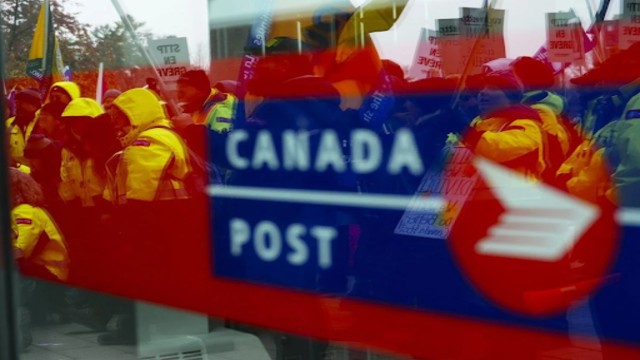
Canada Post employees and supporters rally as they are reflected in a window at Canada Post headquarters in Ottawa, Thursday, Nov. 28, 2024. THE CANADIAN PRESS
A storm is brewing at Canada Post as its workers' union moves to restrict overtime, signaling deepening tensions. On Thursday night, the Canadian Union of Postal Workers (CUPW) directed its 55,000 members to reject any work beyond eight hours a day or 40 hours a week.
This comes as CUPW reviews the latest contract offers from the mail carrier. Though no formal strike has begun, the overtime ban could trigger major mail delays across the country.
Contract Talks Stumble
Negotiations between Canada Post and CUPW hit a wall Thursday evening. A brief meeting between the two sides ended without progress.
According to Canada Post spokesperson Lisa Liu, the union raised only a few issues “informally.” The meeting lasted less than 30 minutes, far from what the company hoped would show meaningful progress.
Canada Post urged CUPW to return swiftly with a detailed response to the proposals shared earlier this week.
Dispute Over Wages and Weekend Work
At the heart of the dispute is a demand for a 19% wage increase. CUPW argues this is necessary after years of inflation that eroded workers’ earnings.
But one of the most divisive issues is weekend staffing. Canada Post wants more flexibility to meet rising demand for parcel delivery, especially on weekends. They’re proposing an increase in part-time workers who can be scheduled as needed.
The union, however, sees this as a threat to full-time positions. CUPW claims the company wants to raise part-time roles in urban areas by 20%, forcing some to work up to 30 hours a week without full-time benefits.
Big Changes Loom Over Canada Post
The dispute comes just days after a federal report painted a grim picture of Canada Post's future. The report, led by arbitrator William Kaplan, warned the company is “facing an existential crisis.”
His 162-page analysis recommended dramatic overhauls. These included shutting down rural post offices, increasing community mailboxes, and ending daily home mail delivery for individuals.
Kaplan also suggested creating more part-time roles but insisted they must match full-time pay and benefits. He rejected the idea of turning postal work into freelance-style “gig” jobs.
Union Rejects Truce Proposal
Earlier this week, CUPW had asked Canada Post for a two-week “truce” to allow more time for reviewing the offers. The company refused.
In response, the union imposed the overtime ban to reduce disruptions while avoiding full strike action — for now.
CUPW warned that more job actions could follow.
Potential Impact Could Be Massive
If postal workers do strike, the fallout could be severe. Daily delivery of around 8.5 million letters and 1.1 million parcels would grind to a halt.
Canada Post is already in financial trouble. The organization lost $803 million in the first nine months of 2024 and has racked up $3.8 billion in losses since 2018. A federal loan of $1.03 billion earlier this year helped keep it afloat.
A new strike would mark the second disruption in less than a year. The previous stoppage cost small businesses an estimated $1.6 billion, according to the Canadian Federation of Independent Business.
As both sides dig in, Canadians are left bracing for delays — and possibly worse.















